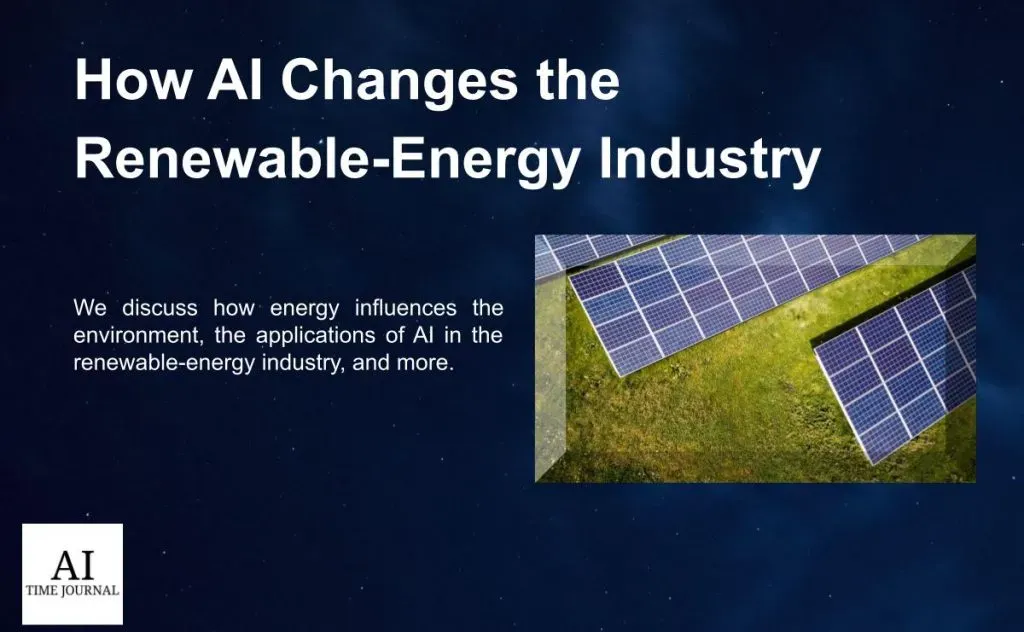Clean energy AI is poised to revolutionize the way we harness technology while combating climate change. At a recent AI summit in Paris, Prime Minister Justin Trudeau highlighted the necessity of integrating clean energy solutions to support the growing demands of artificial intelligence. His remarks underscored the need for sustainable nuclear energy technology as a viable alternative, ensuring that progress does not come at the expense of our planet. Trudeau’s vision for AI investment in Canada emphasizes the importance of making these advancements accessible to all, rather than just the wealthy elite. By fostering innovation in clean energy AI, we can pave the way toward a more equitable and environmentally-friendly future.
The intersection of renewable energy and artificial intelligence is becoming increasingly significant in our quest for sustainable development. During recent discussions, including those led by Canadian leaders, the focus has shifted to how emerging technologies can be supported by clean energy sources. As we explore the potential of AI regulation, the role of nuclear energy and other green technologies becomes paramount in addressing the energy demands of AI systems. This holistic approach not only aims to reduce the carbon footprint associated with technological advancement but also seeks to ensure that the benefits of AI extend beyond affluent demographics. Embracing these innovations will be crucial as we strive for a balanced and responsible integration of AI into our everyday lives.
The Importance of Clean Energy for AI Development
At the recent AI summit in Paris, Prime Minister Justin Trudeau underscored the critical need for clean energy as a foundation for advancing artificial intelligence technologies. He emphasized that the growing energy requirements of AI should not lead to further environmental degradation. Instead, Trudeau proposed that nuclear energy technology could serve as a sustainable alternative, providing the necessary power to fuel AI without exacerbating climate change. This approach aligns with global efforts to transition to cleaner energy sources, ensuring that the expansion of AI is both innovative and environmentally responsible.
Trudeau’s insights reflect a broader recognition among world leaders about the intersection of technology and sustainability. As AI systems become more complex and demanding, the need for reliable energy sources becomes even more pressing. By investing in clean energy infrastructure, countries can support AI development while simultaneously addressing climate goals. This dual focus not only fosters technological advancement but also promotes a healthier planet, showcasing the potential of clean energy AI to revolutionize both industry and environmental stewardship.
Nuclear Energy: A Clean Solution for AI Power Needs
During his address at the AI summit, Trudeau made a compelling case for nuclear energy as a viable solution to meet the increasing power demands of artificial intelligence. With the rapid integration of AI across various sectors, including healthcare, finance, and transportation, the energy consumption associated with these technologies is set to skyrocket. Nuclear energy offers a low-carbon alternative that can provide the necessary electricity without the harmful emissions associated with fossil fuels. By leveraging this technology, Canada can position itself as a leader in both AI and sustainable energy.
In parallel, the development of nuclear energy technology is crucial for achieving a balance between technological growth and environmental preservation. As countries explore new ways to harness AI, the focus on clean energy solutions becomes paramount. Trudeau’s commitment to developing nuclear energy reflects a strategic vision for a future where AI thrives on sustainable power sources, helping to mitigate climate change while driving innovation. This proactive approach not only addresses current energy needs but also sets the stage for a resilient energy infrastructure capable of supporting future advancements in AI.
AI Investment in Canada: A Hub for Innovation
Canada’s reputation as an attractive destination for AI investment is bolstered by its rich reserves of critical minerals and specialized semiconductor expertise. During the AI summit, Trudeau highlighted these assets as essential for fostering a robust AI ecosystem. The country’s clean electricity grid further enhances its appeal, providing a sustainable energy source that aligns with the ideals of clean energy AI. By promoting these advantages, Canada aims to attract global tech companies eager to harness local resources for their AI initiatives.
In addition to these resources, Canada’s commitment to responsible AI regulation is a significant factor for investors. As concerns about AI’s impact on society grow, establishing clear guidelines and ethical standards becomes essential. Trudeau’s emphasis on ensuring that AI benefits all, rather than a select few, positions Canada as a leader in fostering an inclusive AI landscape. This focus on equitable access, combined with the country’s technological capabilities, makes Canada a prime location for AI investment and innovation.
Challenges and Ethical Considerations in AI Development
While the prospects of AI are promising, the path to its development is fraught with challenges. Reports of AI failures, such as inappropriate content generation and the ethical implications surrounding labor practices, highlight the need for robust regulatory frameworks. Trudeau’s call for regulation at the AI summit underscores the necessity of addressing these issues to safeguard public trust in AI technologies. Ensuring that AI serves the broader population rather than reinforcing existing inequalities is crucial for sustainable progress.
Moreover, the ethical considerations surrounding AI training methods raise questions about the responsibility of tech companies. The reliance on underpaid workers for training AI models, as seen in OpenAI’s approach, reveals a troubling disparity in the technology sector. As Canada positions itself as a leader in AI investment, it must also prioritize ethical practices and accountability in AI development. By fostering an environment where ethical considerations are at the forefront, Canada can create a more sustainable and equitable future for AI.
The Role of AI Regulation in Promoting Fairness
At the AI summit, Trudeau’s advocacy for AI regulation was a pivotal moment in addressing the disparities in technology access and benefits. By establishing clear regulatory guidelines, Canada can ensure that AI technologies are developed and deployed in a manner that is fair and equitable. This regulatory framework is designed to protect consumers and promote responsible innovation, ensuring that advancements in AI do not come at the expense of societal values.
Moreover, effective AI regulation can help mitigate the risks associated with generative AI technology. As seen in various incidents involving inappropriate content generation, the lack of oversight can lead to significant public backlash and reputational damage for tech companies. By implementing stringent regulations, Canada can enhance its position as a trusted hub for AI development, attracting investment while fostering a culture of responsibility and transparency. This approach not only benefits the industry but also builds public confidence in AI technologies.
The Future of AI and Clean Energy Technologies
The convergence of AI and clean energy technologies presents an unprecedented opportunity for innovation and sustainability. As the world grapples with climate change, the integration of AI into clean energy solutions can optimize energy consumption and improve efficiency. Trudeau’s vision for utilizing clean energy AI is not just about powering technology; it’s about creating a sustainable future where energy and technology coexist harmoniously.
In this evolving landscape, the potential applications of AI in clean energy are vast, from enhancing energy grid management to improving the performance of renewable energy sources. By investing in research and development, Canada can lead the charge in harnessing AI to drive advancements in clean energy technologies. This leadership will not only contribute to a healthier planet but will also position Canada as a global player in the green technology sector, paving the way for a more sustainable future.
Global Collaborations for Clean Energy and AI
Trudeau’s commitment to collaborating with G7 partners highlights the importance of global cooperation in addressing the challenges posed by AI and energy demands. By working together, countries can share best practices, pool resources, and develop innovative solutions that promote both AI advancements and clean energy initiatives. This collaborative approach is essential in creating a unified strategy to tackle climate change while fostering technological progress.
Moreover, international partnerships can enhance Canada’s position in the global AI landscape. By aligning with other nations focused on clean energy and AI regulation, Canada can play a pivotal role in shaping the future of technology. These collaborations not only facilitate knowledge exchange but also promote the development of standards that ensure AI technologies are deployed responsibly and ethically across borders.
The Economic Impact of Clean Energy AI
The economic implications of integrating clean energy with AI technologies are significant. By investing in clean energy AI, Canada can create jobs, stimulate economic growth, and attract foreign investment. Trudeau’s emphasis on building a strong infrastructure to support AI development reflects a strategic approach to harnessing these economic benefits while addressing energy demands responsibly.
Furthermore, the transition to clean energy sources can enhance energy security and reduce dependence on fossil fuels, contributing to long-term economic stability. The integration of AI into energy management systems can optimize resource allocation and drive efficiency, leading to cost savings for both businesses and consumers. This economic transformation not only supports innovation but also aligns with Canada’s commitment to sustainability, presenting a comprehensive strategy for future growth.
Innovations in AI and Their Implications for Society
The rapid evolution of AI technologies has profound implications for society, particularly in how we interact with the world around us. Innovations such as generative AI are reshaping industries and redefining the boundaries of creativity and automation. However, as Trudeau pointed out, the benefits of these advancements must be accessible to all, ensuring that no group is left behind in the technological revolution.
Additionally, the societal impact of AI technologies extends beyond economic considerations. As AI becomes more integrated into our daily lives, issues related to privacy, security, and ethical use will become increasingly prominent. By proactively addressing these concerns through effective regulation and public engagement, Canada can lead the way in creating a responsible AI framework that prioritizes the well-being of its citizens.
Frequently Asked Questions
What role does clean energy AI play in the development of nuclear energy technology?
Clean energy AI is crucial in optimizing nuclear energy technology by enhancing efficiency and safety in energy generation. At the AI summit in Paris, Justin Trudeau highlighted the need for clean energy solutions to support AI advancements, with nuclear energy being a key component. By utilizing AI to monitor and manage nuclear reactors, we can ensure a reliable and sustainable energy source that meets the growing demands of technology without compromising climate goals.
How can AI investment in Canada contribute to clean energy initiatives?
AI investment in Canada is vital for advancing clean energy initiatives as the country boasts one of the world’s cleanest electricity grids. Prime Minister Justin Trudeau pointed out that with access to critical minerals and specialized semiconductor expertise, Canada can attract significant AI investment aimed at developing technologies to enhance clean energy production and reduce the carbon footprint of AI operations.
What are the implications of AI regulation on clean energy and technology?
AI regulation is essential to ensure that the development of clean energy AI technologies serves the broader population rather than just a select few. Trudeau emphasized the need for regulations that promote equitable access to AI benefits, thus fostering innovation in clean energy without exacerbating climate change. Effective regulation can guide the integration of AI into energy systems, ensuring they remain sustainable and accessible.
Why is the discussion of clean energy AI crucial at international summits like the AI summit in Paris?
Discussions around clean energy AI at international summits, such as the AI summit in Paris, are crucial because they highlight the global commitment to sustainable energy solutions. Leaders like Justin Trudeau advocate for collaboration among G7 partners to develop clean energy infrastructures that can support AI advancements. This dialogue is essential for addressing climate challenges while harnessing the transformative power of AI.
How does generative AI impact the clean energy sector?
Generative AI can significantly impact the clean energy sector by providing innovative solutions for energy efficiency and sustainability. However, as highlighted during the discussions at the AI summit, the integration of generative AI in energy applications must be approached carefully to avoid unintended consequences. Ensuring that AI technologies are developed responsibly will help maximize their benefits for clean energy initiatives.
What challenges does AI face in the context of clean energy and climate change?
AI faces several challenges in the context of clean energy and climate change, including high energy demands for operations and potential negative environmental impacts. Trudeau pointed out at the AI summit that while AI can drive innovation, it is essential to develop clean energy sources, such as nuclear technology, to meet these demands sustainably. Balancing AI growth with climate goals remains a critical challenge for policymakers.
| Key Point | Details |
|---|---|
| Importance of Clean Energy | Trudeau emphasized the need for clean energy to support AI technology without compromising climate efforts. |
| Nuclear Energy as a Solution | He advocated for nuclear energy as a clean solution to meet the increased energy demands of AI. |
| Accessibility of AI Benefits | Trudeau stated that the advantages of AI should be accessible to everyone, not just the wealthy elite. |
| Regulation of AI | He highlighted the importance of regulation to ensure AI serves people in both high and low-income countries. |
| AI Investment in Canada | Trudeau positioned Canada as a prime location for AI investment due to its clean energy grid and resources. |
| Concerns Over AI Failures | Reports of AI failures, including inappropriate content generation, raise questions about the reliability of AI technologies. |
| Impact on Critical Thinking | A study revealed that using AI might decrease critical thinking skills among users. |
Summary
Clean energy AI is becoming increasingly important as leaders like Prime Minister Justin Trudeau advocate for sustainable energy solutions to power advancements in artificial intelligence. At a recent summit, Trudeau highlighted the necessity of nuclear energy, emphasizing that it could provide the clean energy needed to fuel AI without exacerbating climate change. He called for regulations to ensure that the benefits of AI reach all socioeconomic classes, rather than just the wealthy few. Furthermore, Canada is positioned as a leading destination for AI investment, boasting a clean electricity grid and essential resources. However, the discussion surrounding AI is complicated by concerns over reliability and potential negative impacts on critical thinking. As the world moves towards integrating AI into various sectors, the focus on clean energy will remain crucial.








